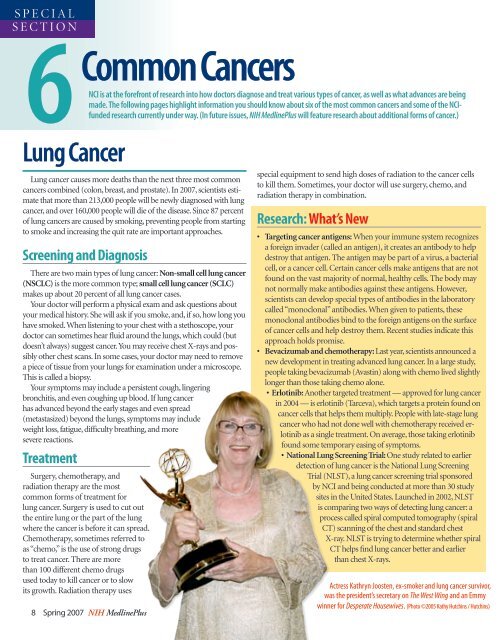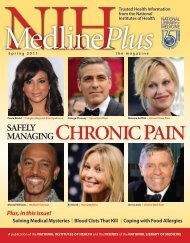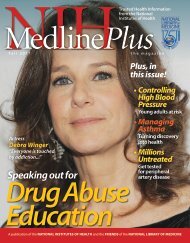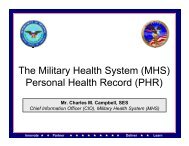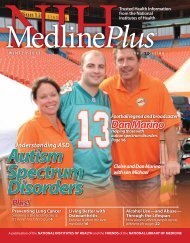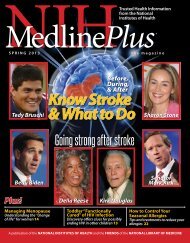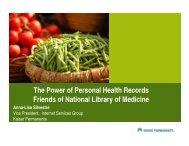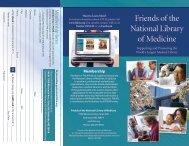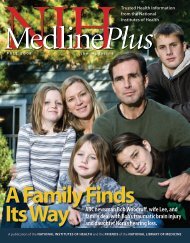Sam Donaldson's cancer survival tips - National Library of Medicine ...
Sam Donaldson's cancer survival tips - National Library of Medicine ...
Sam Donaldson's cancer survival tips - National Library of Medicine ...
You also want an ePaper? Increase the reach of your titles
YUMPU automatically turns print PDFs into web optimized ePapers that Google loves.
SPECIAL<br />
SECTION<br />
6<br />
Common<br />
Lung Cancer<br />
Cancers<br />
NCI is at the forefront <strong>of</strong> research into how doctors diagnose and treat various types <strong>of</strong> <strong>cancer</strong>, as well as what advances are being<br />
made. The following pages highlight information you should know about six <strong>of</strong> the most common <strong>cancer</strong>s and some <strong>of</strong> the NCIfunded<br />
research currently under way. (In future issues, NIH MedlinePlus will feature research about additional forms <strong>of</strong> <strong>cancer</strong>.)<br />
Lung <strong>cancer</strong> causes more deaths than the next three most common<br />
<strong>cancer</strong>s combined (colon, breast, and prostate). In 2007, scientists estimate<br />
that more than 213,000 people will be newly diagnosed with lung<br />
<strong>cancer</strong>, and over 160,000 people will die <strong>of</strong> the disease. Since 87 percent<br />
<strong>of</strong> lung <strong>cancer</strong>s are caused by smoking, preventing people from starting<br />
to smoke and increasing the quit rate are important approaches.<br />
Screening and Diagnosis<br />
There are two main types <strong>of</strong> lung <strong>cancer</strong>: Non-small cell lung <strong>cancer</strong><br />
(NSCLC) is the more common type; small cell lung <strong>cancer</strong> (SCLC)<br />
makes up about 20 percent <strong>of</strong> all lung <strong>cancer</strong> cases.<br />
Your doctor will perform a physical exam and ask questions about<br />
your medical history. She will ask if you smoke, and, if so, how long you<br />
have smoked. When listening to your chest with a stethoscope, your<br />
doctor can sometimes hear fluid around the lungs, which could (but<br />
doesn’t always) suggest <strong>cancer</strong>. You may receive chest X-rays and possibly<br />
other chest scans. In some cases, your doctor may need to remove<br />
a piece <strong>of</strong> tissue from your lungs for examination under a microscope.<br />
This is called a biopsy.<br />
Your symptoms may include a persistent cough, lingering<br />
bronchitis, and even coughing up blood. If lung <strong>cancer</strong><br />
has advanced beyond the early stages and even spread<br />
(metastasized) beyond the lungs, symptoms may include<br />
weight loss, fatigue, difficulty breathing, and more<br />
severe reactions.<br />
Treatment<br />
Surgery, chemotherapy, and<br />
radiation therapy are the most<br />
common forms <strong>of</strong> treatment for<br />
lung <strong>cancer</strong>. Surgery is used to cut out<br />
the entire lung or the part <strong>of</strong> the lung<br />
where the <strong>cancer</strong> is before it can spread.<br />
Chemotherapy, sometimes referred to<br />
as “chemo,” is the use <strong>of</strong> strong drugs<br />
to treat <strong>cancer</strong>. There are more<br />
than 100 different chemo drugs<br />
used today to kill <strong>cancer</strong> or to slow<br />
its growth. Radiation therapy uses<br />
8 Spring 2007 NIH MedlinePlus<br />
special equipment to send high doses <strong>of</strong> radiation to the <strong>cancer</strong> cells<br />
to kill them. Sometimes, your doctor will use surgery, chemo, and<br />
radiation therapy in combination.<br />
Research: What’s New<br />
• Targeting <strong>cancer</strong> antigens: When your immune system recognizes<br />
a foreign invader (called an antigen), it creates an antibody to help<br />
destroy that antigen. The antigen may be part <strong>of</strong> a virus, a bacterial<br />
cell, or a <strong>cancer</strong> cell. Certain <strong>cancer</strong> cells make antigens that are not<br />
found on the vast majority <strong>of</strong> normal, healthy cells. The body may<br />
not normally make antibodies against these antigens. However,<br />
scientists can develop special types <strong>of</strong> antibodies in the laboratory<br />
called “monoclonal” antibodies. When given to patients, these<br />
monoclonal antibodies bind to the foreign antigens on the surface<br />
<strong>of</strong> <strong>cancer</strong> cells and help destroy them. Recent studies indicate this<br />
approach holds promise.<br />
• Bevacizumab and chemotherapy: Last year, scientists announced a<br />
new development in treating advanced lung <strong>cancer</strong>. In a large study,<br />
people taking bevacizumab (Avastin) along with chemo lived slightly<br />
longer than those taking chemo alone.<br />
• Erlotinib: Another targeted treatment — approved for lung <strong>cancer</strong><br />
in 2004 — is erlotinib (Tarceva), which targets a protein found on<br />
<strong>cancer</strong> cells that helps them multiply. People with late-stage lung<br />
<strong>cancer</strong> who had not done well with chemotherapy received erlotinib<br />
as a single treatment. On average, those taking erlotinib<br />
found some temporary easing <strong>of</strong> symptoms.<br />
• <strong>National</strong> Lung Screening Trial: One study related to earlier<br />
detection <strong>of</strong> lung <strong>cancer</strong> is the <strong>National</strong> Lung Screening<br />
Trial (NLST), a lung <strong>cancer</strong> screening trial sponsored<br />
by NCI and being conducted at more than 30 study<br />
sites in the United States. Launched in 2002, NLST<br />
is comparing two ways <strong>of</strong> detecting lung <strong>cancer</strong>: a<br />
process called spiral computed tomography (spiral<br />
CT) scanning <strong>of</strong> the chest and standard chest<br />
X-ray. NLST is trying to determine whether spiral<br />
CT helps find lung <strong>cancer</strong> better and earlier<br />
than chest X-rays.<br />
Actress Kathryn Joosten, ex-smoker and lung <strong>cancer</strong> survivor,<br />
was the president’s secretary on The West Wing and an Emmy<br />
winner for Desperate Housewives. (Photo ©2005 Kathy Hutchins / Hutchins)


